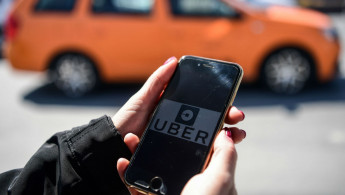Erdogan says Uber 'finished' in Turkey
Erdogan's comments, in a late night speech Friday in Istanbul, came after the government agreed new rules that are expected to severely complicate Uber's operations in Turkey.
Drivers of Istanbul's yellow taxis have over the last months waged an intense campaign to have Uber banned, saying the company is eating into their business without having a proper legal basis for work.
"This thing emerged called Uber or Muber or whatever," said Erdogan. "But this issue is now finished. It's over now."
"Our Prime Minister (Binali Yildirim) made the announcement. We have our system of taxis," he added.
Last month, Yildirim’s government issued a directive sharply hiking fines and threatened blacklisting for companies whose vehicles illegally work as taxis.
The official taxi drivers association said at the time the measure would be a major threat to Uber, if it was properly enforced by the traffic police.
Erdogan said that while Uber may be popular in some European countries, Turkey was different.
"Why did it (Uber) emerge? Because it was in Europe. But what is Europe to me? We will take the decision ourselves."
His comments come three weeks ahead of keenly contested presidential and parliamentary elections. Many Istanbul taxi drivers - though not all - are strong Erdogan supporters and the main taxi associations back him.
'Pirate carrier'
After Erdogan spoke, dozens of taxi drivers rallied to support him outside of his private residence in the Uskudar district of Istanbul, the Dogan news agency said.
Interior Minister Suleyman Soylu backed up Erdogan's comments, describing Uber as a "unauthorised carrier, in other words a pirate carrier".
"Turkey is a state of law. We don't need to say sorry for this. It (Uber) has not been given the authorisation to carry out taxi services," he was quoted by the state-run Anadolu news agency as saying.
The 17,400 official yellow taxis in Istanbul are a pillar of the city's often patchy transport system, but critics say that poor service and overcharging opened up an opportunity for Uber.
However the taxi drivers slam Uber as "pirates" who are swallowing their incomes in an already tight market.
Uber drivers have been physically attacked and even fired at, but taxi drivers reject being involved in a harassment campaign.
Uber said this week it is committed to working in Turkey "to the end" and has insisted it is operating within the law.
It has expanded rapidly in Turkey and according to Turkish press reports there are more than 10,000 Uber vehicles in Istanbul.
The company did not comment on the situation on Saturday.
The tension in Turkey is one of a number of headaches for Uber and its new chief executive Dara Khosrowshahi, who took over last August after founder Travis Kalanick was ousted following a series of scandals.
It has lost its license in London, although it is still operating there pending appeal, while its self-driving car programme in the United States suffered a blow with a deadly accident.
The app was also briefly banned in Egypt after taxi drivers held protests against the company. The Cairo government said it is working on new regulations that would bring Uber and other hail-riding apps in-line with taxi services in the country.
In February, the San Francisco-headquartered company said it would pull out of Morocco because of the North African country's failure to reform its strict transport rules.
It had been operating in Morocco illegally for three years despite having 19,000 users and over 300 drivers there.
Agencies contributed to this report.





 Follow the Middle East's top stories in English at The New Arab on Google News
Follow the Middle East's top stories in English at The New Arab on Google News
![Israeli forces ordered bombed Gaza's Jabalia, ordering residents to leave [Getty]](/sites/default/files/styles/image_330x185/public/2176418030.jpeg?h=a5f2f23a&itok=_YGZaP1z)

